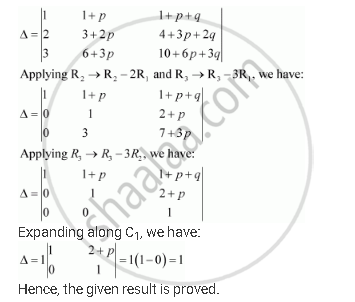Advertisements
Advertisements
Question
Using properties of determinants, prove that:
`|(1, 1+p, 1+p+q),(2, 3+2p, 4+3p+2q),(3,6+3p,10+6p+3q)| = 1`
Solution

APPEARS IN
RELATED QUESTIONS
Using properties of determinants prove the following: `|[1,x,x^2],[x^2,1,x],[x,x^2,1]|=(1-x^3)^2`
Using the properties of determinants, prove the following:
`|[1,x,x+1],[2x,x(x-1),x(x+1)],[3x(1-x),x(x-1)(x-2),x(x+1)(x-1)]|=6x^2(1-x^2)`
Using properties of determinants, prove that
`|((x+y)^2,zx,zy),(zx,(z+y)^2,xy),(zy,xy,(z+x)^2)|=2xyz(x+y+z)^3`
Using the property of determinants and without expanding, prove that:
`|(a-b,b-c,c-a),(b-c,c-a,a-b),(a-a,a-b,b-c)| = 0`
Using the property of determinants and without expanding, prove that:
`|(2,7,65),(3,8,75),(5,9,86)| = 0`
Using the property of determinants and without expanding, prove that:
`|(1, bc, a(b+c)),(1, ca, b(c+a)),(1, ab, c(a+b))| = 0`
By using properties of determinants, show that:
`|(1+a^2-b^2, 2ab, -2b),(2ab, 1-a^+b^2, 2a),(2b, -2a, 1-a^2-b^2)| = (1+a^2+b^2)`
Using properties of determinants, prove that
`|(sin alpha, cos alpha, cos(alpha+ delta)),(sin beta, cos beta, cos (beta + delta)),(sin gamma, cos gamma, cos (gamma+ delta))| = 0`
Using properties of determinants show that
`[[1,1,1+x],[1,1+y,1],[1+z,1,1]] = xyz+ yz +zx+xy.`
Using properties of determinants, prove the following:
Using properties of determinants, prove that \[\begin{vmatrix}a + x & y & z \\ x & a + y & z \\ x & y & a + z\end{vmatrix} = a^2 \left( a + x + y + z \right)\] .
Using properties of determinants, prove that
`|[b+c , a ,a ] ,[ b , a+c, b ] ,[c , c, a+b ]|` = 4abc
Using properties of determinants, prove that:
`|(a,b,b+c),(c,a,c+a),(b,c,a+b)|` = (a+b+c)(a-c)2
Without expanding determinants, prove that `|("a"_1, "b"_1, "c"_1),("a"_2, "b"_2, "c"_2),("a"_3, "b"_3, "c"_3)| = |("b"_1, "c"_1, "a"_1),("b"_2, "c"_2, "a"_2),("b"_3, "c"_3, "a"_3)| = |("c"_1, "a"_1, "b"_1),("c"_2, "a"_2, "b"_2),("c"_3, "a"_3, "b"_3)|`
Without expanding the determinants, show that `|("b" + "c", "bc", "b"^2"c"^2),("c" + "a", "ca", "c"^2"a"^2),("a" + "b", "ab", "a"^2"b"^2)|` = 0
Prove that `|(x + y, y + z, z + x),(z + x, x + y, y + z),(y + z, z + x, x + y)| = 2|(x, y, z),(z, x, y),(y, z, x)|`
Solve the following equation:
`|(x + 2, x + 6, x - 1),(x + 6, x - 1, x + 2),(x - 1, x + 2, x + 6)|` = 0
Without expanding determinants show that
`|(1, 3, 6),(6, 1, 4),(3, 7, 12)| + 4|(2, 3, 3),(2, 1, 2),(1, 7, 6)| = 10|(1, 2, 1),(3, 1, 7),(3, 2, 6)|`
Select the correct option from the given alternatives:
Let D = `|(sintheta*cosphi, sintheta*sinphi, costheta),(costheta*cosphi, costheta*sinphi, -sintheta),(-sintheta*sinphi, sintheta*cosphi, 0)|` then
Select the correct option from the given alternatives:
If x = –9 is a root of `|(x, 3, 7),(2, x, 2),(7, 6, x)|` = 0 has other two roots are
Answer the following question:
Evaluate `|(2, 3, 5),(400, 600, 1000),(48, 47, 18)|` by using properties
Evaluate: `|(3x, -x + y, -x + z),(x - y, 3y, z - y),(x - z, y - z, 3z)|`
If A, B and C are angles of a triangle, then the determinant `|(-1, cos"C", cos"B"),(cos"C", -1, cos"A"),(cos"B", cos"A", -1)|` is equal to ______.
If cos2θ = 0, then `|(0, costheta, sin theta),(cos theta, sin theta,0),(sin theta, 0, cos theta)|^2` = ______.
If the value of a third order determinant is 12, then the value of the determinant formed by replacing each element by its co-factor will be 144.
`abs(("x", -7),("x", 5"x" + 1))`
Let P be any non-empty set containing p elements. Then, what is the number of relations on P?
`f : {1, 2, 3) -> {4, 5}` is not a function, if it is defined by which of the following?
A number consists of two digits and the digit in the ten's place exceeds that in the unit's place by 5. If 5 times the sum of the digits be subtracted from the number, the digits of the number are reversed. Then the sum of digits of the number is:
Let 'A' be a square matrix of order 3 × 3, then |KA| is equal to:
Which of the following is correct?
If f(α) = `[(cosα, -sinα, 0),(sinα, cosα, 0),(0, 0, 1)]`, prove that f(α) . f(– β) = f(α – β).
Without expanding determinants find the value of `|(10,57,107),(12,64,124),(15,78,153)|`
By using properties of determinant prove that `|(x + y, y+z, z +x),(z,x,y),(1,1,1)| =0`
Evaluate the following determinant without expanding:
`|(5, 5, 5),(a, b, c),(b + c, c + a, a + b)|`
By using properties of determinant prove that `|(x+y,y+z,z+x),(z,x,y),(1,1,1)|` = 0
Without expanding evaluate the following determinant.
`|(1,"a","b+c"),(1,"b","c+a"),(1,"c","a+b")|`
Without expanding evaluate the following determinant.
`|(1, a, b + c),(1, b, c + a),(1, c, a + b)|`
